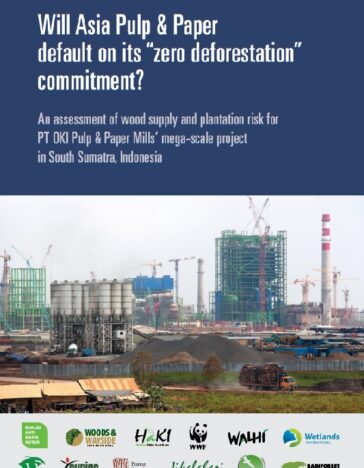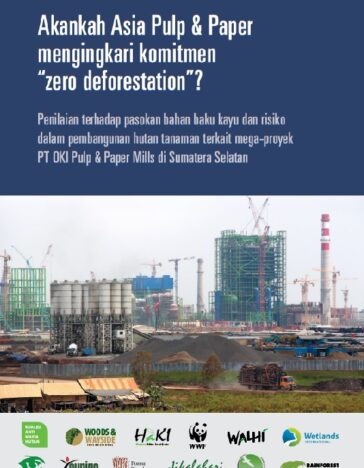
Will Asia Pulp & Paper default on its “zero deforestation” commitment?
-
Climate mitigation and adaptation
-
Peatland conservation and restoration
This study by twelve international and Indonesian NGOs shows that in spite of its high-profile sustainability commitments, Asia Pulp & Paper (APP) is building one of the world’s largest pulp mills in the Indonesian province of South Sumatra without a sustainable wood supply. The US$2.6 billion OKI Pulp & Paper Mills project will expand APP’s wood demand by over 50%, with much of this coming from plantations on high-carbon peatlands.
The mega-scale pulp mill will add significant challenges for Indonesia to prevent catastrophic fires in the region, like the fires that occurred in 2015, and to achieve its international climate change commitments.
APP, Indonesia and China’s largest pulp and paper producer, has championed “zero deforestation” and led corporate sustainability pledges to tackle climate change at the New York Declaration on Forests and Paris COP since it announced sustainability commitments three years ago. During that time, it has been building a mega-scale pulp mill that is primarily financed by the China Development Bank and set to begin operating later this year.
The study details major risks to the productivity of pulpwood plantations established to supply the new mill, including catastrophic fires, peatland subsidence and flooding, social conflict, and pests and diseases. APP has not publicly released a credible plan showing its plantations can grow enough wood for both the new mill and its two existing Sumatra pulp mills over the long term, the study notes. The analysis in the study indicates that the company’s current plantation assets, even under a high growth rate scenario, will not be sufficient to supply the company’s three mills.
Authors: Wetlands International, Koalisi Anti Mafia Hutan, Woods & Wayside International, Hutan Kita Institute, WWF, WALHI, Eyes on the Forest, Auriga, Forest Peoples Program, Jikalahari, Elsam, Rainforest Action Network


